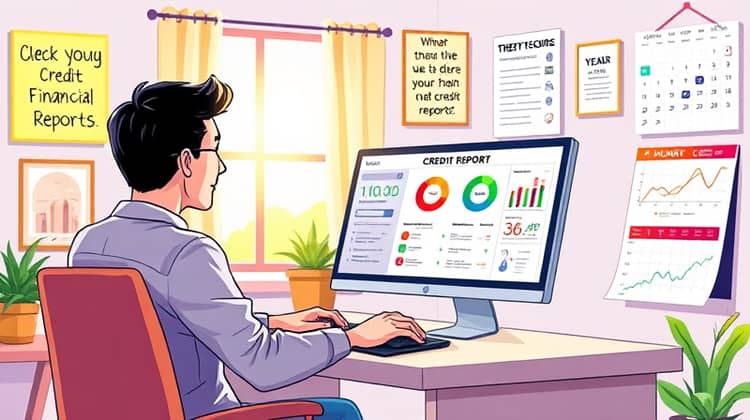Boost Your Credit Score: Steps to Qualify for a Loan

In today's financial landscape, a good credit score is crucial for securing loans and obtaining better interest rates. Whether you are planning to buy a house, finance a car, or even apply for a credit card, understanding the importance of your credit score can make a significant difference in your financial future.
This blog post will guide you through the essential steps to boost your credit score, helping you qualify for loans and enjoy more favorable lending terms. With dedication and the right strategies, anyone can improve their credit score and maintain it over time.
Understanding Credit Scores

A credit score is a numerical representation of your creditworthiness. It reflects the information contained in your credit report, which includes your payment history, amounts owed, length of credit history, new credit, and types of credit accounts. A high credit score indicates to lenders that you are a responsible borrower, while a low score can make it difficult to obtain loans or credit cards.
In general, credit scores range from 300 to 850, with higher scores signifying better credit. Understanding how your credit score is calculated can help you make informed decisions and take the necessary steps to improve it.
- Payment history (35%)
- Amounts owed (30%)
- Length of credit history (15%)
- Types of credit used (10%)
- New credit inquiries (10%)
By grasping the factors that affect your credit score, you can take appropriate actions to enhance it. Knowing what lenders look for will empower you to make the right financial decisions.
Steps to Boost Your Credit Score

Improving your credit score is not an overnight task, but there are several effective strategies that can help you make significant progress. Here’s a comprehensive guide to enhancing your creditworthiness in a gradual yet impactful way.
1. Check Your Credit Report
The first step to boosting your credit score is to check your credit report. You are entitled to one free credit report from each of the three major credit bureaus—Experian, Equifax, and TransUnion—every year. Take advantage of this to review your report for any inaccuracies or discrepancies.
If you find errors, dispute them with the credit bureau. Correcting mistakes can lead to an immediate improvement in your credit score. Furthermore, simply knowing your credit standing will help you to devise a more targeted plan of action.
- Request your free credit reports from all three bureaus.
- Review for errors and discrepancies.
- Take notes of any accounts that are negatively impacting your score.
Keeping a close eye on your credit report not only helps identify issues but also allows you to track your progress over time.
2. Pay Your Bills on Time
Timeliness is crucial when it comes to credit scores. Each late payment can hurt your score significantly. Therefore, making on-time payments is a fundamental step in improving your credit score.
Establishing a consistent payment schedule can help you avoid late fees and maintain your creditworthiness. Consider setting up automatic payments or reminders to ensure you never miss a due date.
3. Reduce Your Debt
High levels of debt can negatively impact your credit score, primarily through your credit utilization ratio. This ratio is calculated by dividing your total outstanding debt by your total available credit. To reduce your debt, consider strategies like the snowball or avalanche methods, which prioritize paying off smaller debts first or those with the highest interest rates, respectively.
As you pay down your debts, your credit utilization ratio will improve, consequently boosting your credit score. Aim to keep your credit utilization below 30% to maintain a healthy credit profile.
4. Avoid New Hard Inquiries
Every time you apply for credit, lenders perform a hard inquiry on your credit report to assess your risk factor, which can temporarily reduce your score. Therefore, avoid applying for new credit unless absolutely necessary.
Being strategic about new credit applications will help prevent unnecessary hits to your score, allowing it to recover more quickly after a hard inquiry.
5. Increase Your Credit Limits
Increasing your credit limits can help improve your credit utilization ratio. Contact your credit issuers and ask for a higher limit, especially if you have a good track record of on-time payments. This approach can be beneficial, provided you don’t accrue more debt as a result.
It’s important to remember that having more credit available can be tempting, but responsible management will help you reap the benefits without overspending.
6. Use a Secured Credit Card
If you’re starting from scratch or trying to rebuild your credit, a secured credit card can be a valuable tool. Secured cards require a cash deposit upfront, which typically serves as your credit limit. By using the card responsibly, you can establish or improve your credit score over time.
Make sure to pay off your balance each month to avoid interest charges and demonstrate good credit habits to potential lenders.
How Long Will It Take?

The timeframe for boosting your credit score varies depending on individual circumstances. For some, significant improvements can be seen within a few months, while for others, it may take a year or more. The key is consistency in your efforts and remaining patient as you implement these strategies.
Monitor your credit score regularly to see the impact of your actions. Keep in mind that some aspects, like long-term payment history, take time to positively affect your score.
Best Practices for Maintaining a High Credit Score

Once you’ve boosted your score, it’s crucial to maintain it. Developing good habits will not only help keep your score high but also contribute to long-term financial health.
You can achieve this by managing your credit responsibly and making informed financial decisions.
- Continue paying bills on time
- Keep credit utilization low
- Avoid closing old accounts unless necessary
- Monitor your credit regularly
By following these best practices, you'll position yourself for sustained credit health and improved financial opportunities.
Preparing to Apply for a Loan

Once you’ve improved your credit score, you can start preparing to apply for a loan. Having a strong credit standing can lead to better loan terms and interest rates, ultimately saving you money over time.
Before applying, ensure your financial documents are in order and that you understand the terms of any loan you consider.
- Gather your financial documents (income statements, tax returns, etc.).
- Determine how much you can afford to borrow and repay.
- Shop around for lenders and compare rates and terms.
Being well-prepared will increase your chances of approval and ensure you get the best deal possible.
Conclusion

Improving and maintaining your credit score is a continuous process that requires commitment and financial discipline. By following the steps outlined in this blog post, you can enhance your creditworthiness and open the door to various credit and loan opportunities.
Remember, your credit score is a reflection of your financial habits. The better you manage your finances, the higher your score will be, allowing you to secure better loan conditions in the future.






